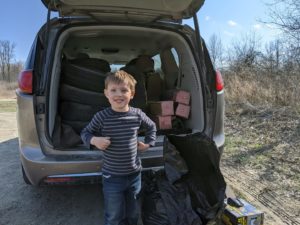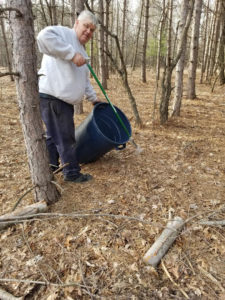On the Ground: Public Land Clean-Up Challenge Winners Announced

Nick B.’s son, Theo, posing with the abundant litter they collected from the Petersburg State Game Area.
Spanning the month of April 2020, the On the Ground (OTG) Public Land Clean-Up Challenge gave individuals and families the opportunity to give back to their public lands while recreating outdoors and practicing social distancing. Many individuals shared photographs and short stories about why they have chosen to participate in the effort, often citing a love of the resource, their unfavorable opinion of littering and the positive opportunity to give back to public land that they live near. State game areas, state forests, Grouse Enhanced Management Sites, access sites, wildlife management areas and wildlife viewing areas have all benefited from the stewardship efforts of Michiganders over the course of this initiative.

Jack A. practicing good public land stewardship by picking up litter in the Au Sable State Forest.
This challenge was hosted by the OTG program to continue to encourage public land stewardship despite the cancellation of OTG habitat improvement events due to COVID-19.
On May 5, we randomly drew two participants to each receive a $50 Cabela’s gift card. Congratulations to Nick B. and Jack A. for each being the winners of a $50 Cabela’s gift card!
The OTG program is made possible through a Memorandum of Agreement between the Michigan Department of Natural Resources Wildlife Division and Michigan United Conservation Clubs (MUCC). MUCC is the largest statewide conservation organization in the nation. Founded in 1937, our mission is to unite citizens to conserve, protect and enhance Michigan’s natural resources and outdoor heritage. This mission drives everything we do as an organization. For more information about our organization, please visit mucc.org.
On the Ground is MUCC’s volunteer wildlife habitat improvement program. More than 3,000 volunteers have improved wildlife habitat through weekend projects like building brush piles, removing invasive trees, restoring grassland habitat through native flower and grass plantings, installing fish spawning structures, hinge-cutting trees for deer and snowshoe hare, installing wood duck boxes, regenerating aspen stands, performing river clean-ups, planting a variety of trees for wildlife food and cover and now removing litter.
OTG hosts projects which improve habitat for wildlife on public land. Through this program, hunters, anglers, trappers and outdoor enthusiasts of all kinds have the opportunity to donate their time for the benefit of the species they enjoy. The work completed by volunteers and wildlife professionals shows the general public that Michiganders are true conservationists and demonstrates how hunting license dollars are put to use. For more information about the OTG program and how to get involved, please visit mucc.org/on-the-ground.
We would like to thank all those who participated in the OTG Public Land Clean-Up Challenge. We were impressed by the number of entries we received and the great work we were able to complete across Michigan. Your good stewardship and volunteerism are appreciated.
The post On the Ground: Public Land Clean-Up Challenge Winners Announced appeared first on Michigan United Conservation Clubs.
Recent Posts



